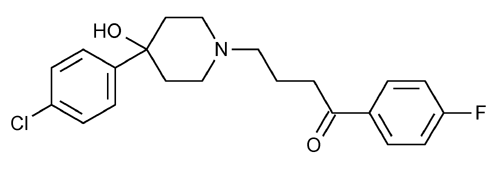Haloperidol
1-Butanone, 4-[4-(4-chlorophenyl)-4-hydroxy-1-piperidinyl]-1-(4-fluorophenyl)-.
4-[4-(p-Chlorophenyl)-4-hydroxypiperidino]-4¢-fluorobutyrophenone
» Haloperidol contains not less than 98.0 percent and not more than 102.0 percent of C21H23ClFNO2, calculated on the dried basis.
Packaging and storage—
Preserve in tight, light-resistant containers.
Identification—
B:
Ultraviolet Absorption  197U
197U —
—
Solution:
20 µg per mL.
Medium:
dilute hydrochloric acid (1 in 100) in isopropyl alcohol (1 in 9).
Absorptivities at 245 nm, calculated on the dried basis, do not differ by more than 3.0%.
Loss on drying  731
731 —
Dry it in vacuum at 60
—
Dry it in vacuum at 60 for 3 hours: it loses not more than 0.5% of its weight.
for 3 hours: it loses not more than 0.5% of its weight.
Residue on ignition  281
281 :
not more than 0.1%.
:
not more than 0.1%.
Limit of haloperidol related compound A—
Test solution—
Dissolve about 80 mg of Haloperidol, accurately weighed, in 80 mL of isopropyl alcohol in a 100-mL volumetric flask. Add 10 mL of dilute hydrochloric acid (1 in 100), dilute with isopropyl alcohol to volume, and mix.
Standard solution—
Prepare a solution containing 800 µg per mL of USP Haloperidol RS and 8 µg per mL of USP Haloperidol Related Compound A RS in isopropyl alcohol containing 10 mL of dilute hydrochloric acid (1 in 100) in each 100 mL of solution.
Procedure—
Concomitantly determine the absorbances of the Test solution and the Standard solution at the wavelength of maximum absorbance at about 335 nm, with a suitable spectrophotometer, using isopropyl alcohol containing 10 mL of dilute hydrochloric acid (1 in 100) in each 100 mL of solution as the blank. The absorbance of the Test solution is not greater than that of the Standard solution, corresponding to not more than 1.0%.
Assay—
Dissolve about 125 mg of Haloperidol, accurately weighed, in 25 mL of glacial acetic acid, add 3 drops of p-naphtholbenzein TS, and titrate with 0.05 N perchloric acid VS. Perform a blank determination, and make any necessary correction. Each mL of 0.05 N perchloric acid is equivalent to 18.79 mg of C21H23ClFNO2.
Auxiliary Information—
Please check for your question in the FAQs before contacting USP.
Chromatographic Column—
| Topic/Question | Contact | Expert Committee |
| Monograph | Ravi Ravichandran, Ph.D.
Senior Scientist 1-301-816-8330 |
(MDPP05) Monograph Development-Psychiatrics and Psychoactives |
| Reference Standards | Lili Wang, Technical Services Scientist 1-301-816-8129 RSTech@usp.org |
USP32–NF27 Page 2548
Pharmacopeial Forum: Volume No. 29(6) Page 1897
Chromatographic columns text is not derived from, and not part of, USP 32 or NF 27.

